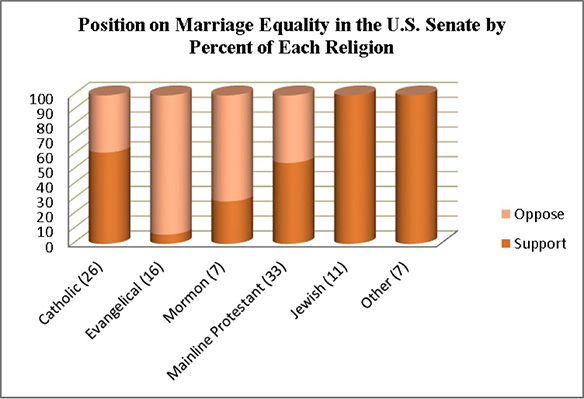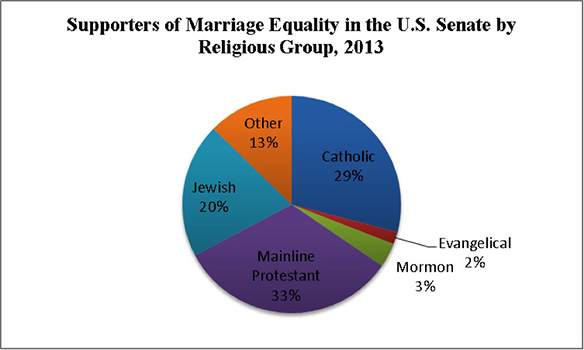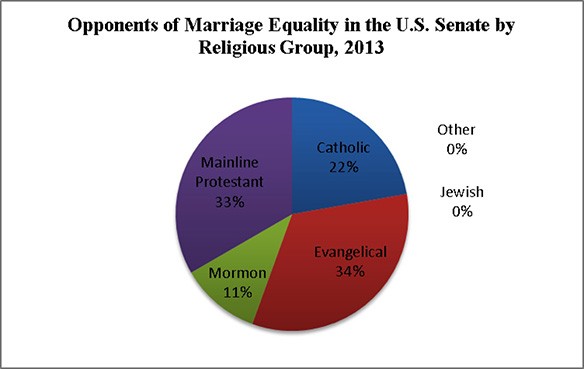Over the past few years, we have witnessed a dizzying shift in the politics of same-sex marriage. The general public has become more accepting of the practice (66 percent of millennials now support it) and political elites, particularly in the Democratic Party, have shifted toward more equal treatment of marriage rights. In May of 2012, just days after Vice President Joe Biden revealed his own change of heart on Meet the Press, President Obama confirmed that his stance had evolved from opposition to support for same-sex marriage. Hillary Clinton, widely regarded as a prospective candidate for a 2016 presidential nomination, also recently publicly switched her position, perhaps in an effort to match those of her potential rivals for the nomination, including New York Governor Andrew Cuomo and Maryland Governor Martin O’Malley.
These examples mirror a virtual deluge of politicians changing their position on same-sex marriage; 55 members of the 113th U.S. Senate now support marriage equality, up from just 16 at the end of 2010. While many observers attribute this shifting landscape to a change of political strategy rather than a sincere change of heart, there is a religious pattern to the trend: The earliest adopters of what would become the consensus marriage equality position of the Democratic Party were disproportionately its Jewish members. Though discussions about the influence of religion on American politics typically tend to focus on the relationship between evangelical Christians, the Christian Right, and the Republican Party, the Jewish faith has an unmistakably liberalizing effect on the Democratic Party, including LGBT rights.

Using a combination of Washington Post reporter Dylan Matthews’ recording of when senators adopted their positions and our own review of the historical record, we analyzed the relationship between senators’ religious affiliations and when they changed their position on same-sex marriage.
The first senator to ever publicly endorse marriage rights for gays and lesbians was Ron Wyden (Oregon), a Jewish Democrat who articulated his support as a candidate for the Senate in 1995, a remarkable 17 years before President Obama would do the same. Wyden never switched his position, at least not on the public record; he ran for office endorsing marriage equality. However, after his election, two other senators followed his lead and endorsed same-sex marriage in 1996: Ted Kennedy (Catholic) and Carol Moseley-Braun (also Catholic). After that, it was a very slow march toward support for marriage equality in the U.S. Senate.
When Senator Dianne Feinstein (D-California) changed her position on marriage equality in 2008, the number of supporters in the Senate finally reached 10. Of those 10 senators, five were Jewish. By the end of 2010, 16 senators supported marriage equality, and of those 16, seven were Jewish. At the end of 2011, 30 senators were in favor, and of those 30, all 11 of the body’s Jewish members were on board.

There is currently a clear religious division regarding support for same-sex marriage in the Senate. Not surprisingly, Jewish and unaffiliated senators are in favor and evangelical Christians are opposed. Of the 16 evangelical senators currently serving, only one, Jon Tester (D-Montana), endorses marriage equality. The other major religions have some diversity of opinion. Fifty-five senators now openly support marriage equality (50 Democrats, three Republicans, and two Independents); 18 of those are Jewish, unaffiliated, or Buddhist (Mazie Hirono, D-Hawaii). The remainder of the Senate is made up of 33 mainline Protestants, 18 of whom support marriage equality; 26 Catholics, 16 of whom support equality; and seven Mormons, two of whom support marriage equality.
Partisan divisions over the issue of same-sex marriage, while stark, may obscure the religious foundations of elected officials’ positions. Jewish politicians gravitate toward the Democratic Party in part because of their cultural liberalism, while evangelical Protestants have abandoned the party in part due to their conservative positions on cultural issues.

As we have shown elsewhere, while religion influences the selection of a party in the first place, it also has an impact on which positions gain consensus within each party’s caucus over time. Jewish senators were the first to embrace the movement for marriage equality, eventually bringing many of their Gentile colleagues along with them, which seems to have solidified the party’s position. On the other side of the aisle, we expect that evangelical Christians will be the last holdouts in opposition to marriage equality, thereby anchoring the Republican side of the issue.
Looking ahead, additional support for same-sex marriage in the Senate likely will require either the persuasion of additional members from moderate religious groups, such as mainline Protestants and Catholics, or the defeat and replacement of evangelical Christian senators by candidates from religious groups that are friendlier to LBGT rights.
Politicians undoubtedly consider many factors when deciding which side of an issue to support. Though social movements, campaign donors, and the majority opinion of their constituents surely enter into their calculations, they also look within to their own values, which are informed in part by their religious beliefs. For support for same-sex marriage to gain such momentum in the Senate in a matter of just a few years, there had to be a critical mass of senators who were willing to go there first. And it was the Senate’s Jewish members who led the way.




